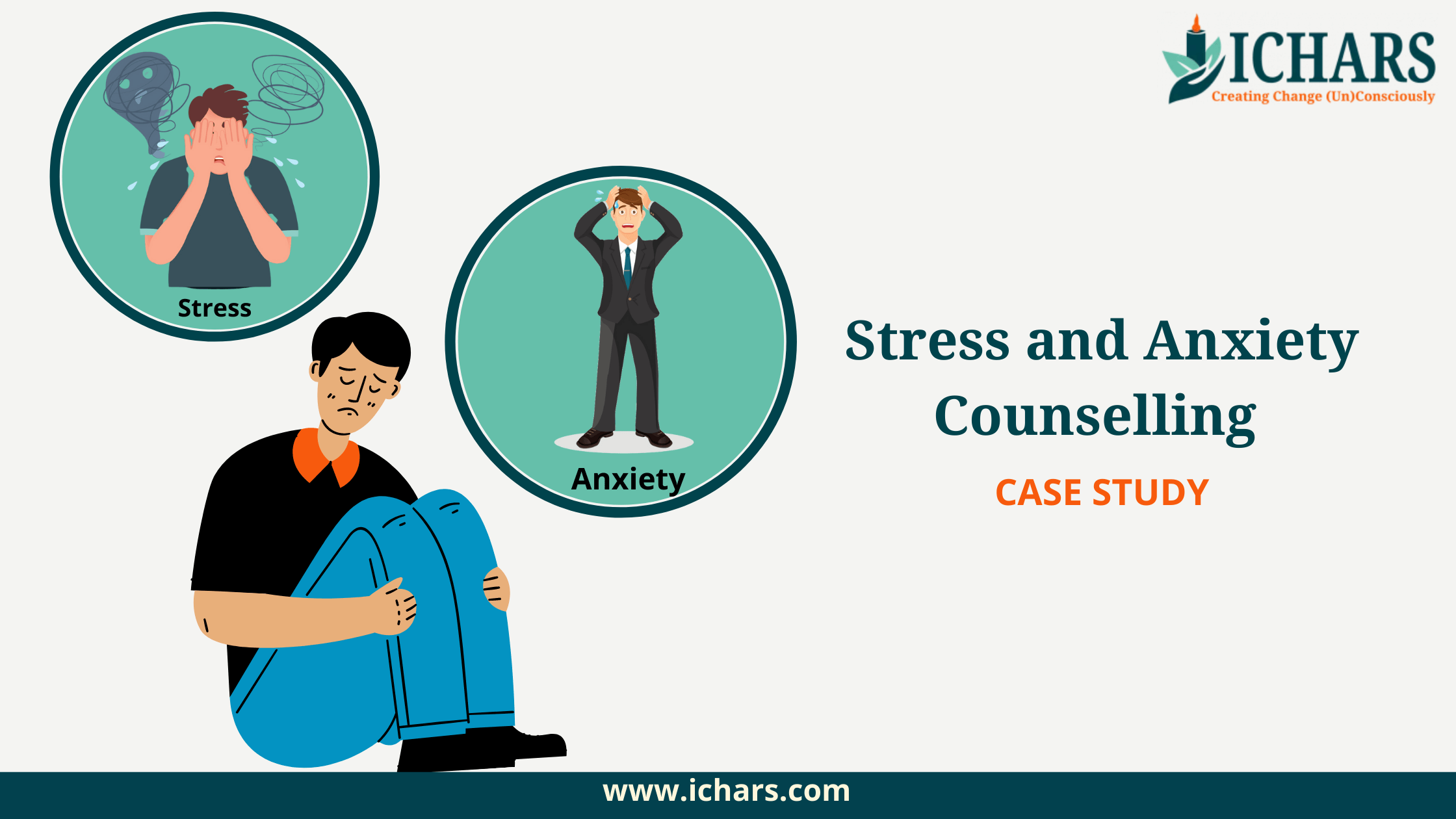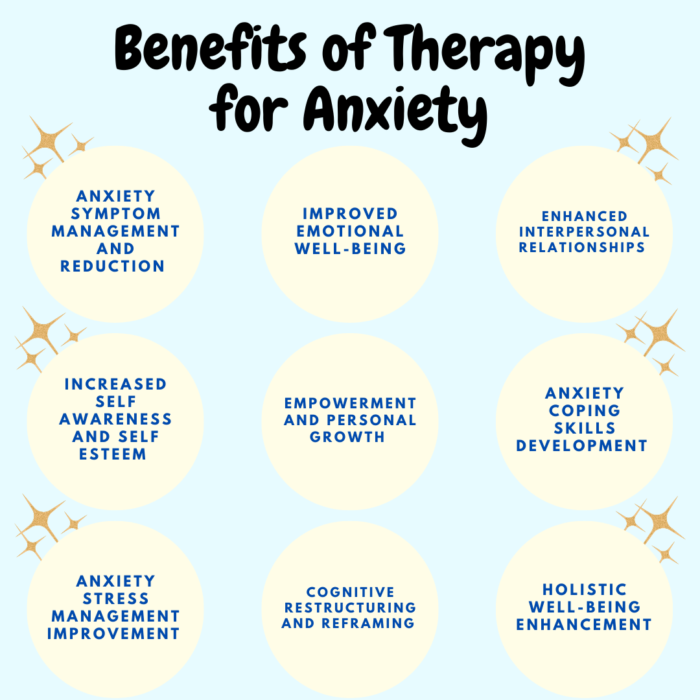Private counselling for anxiety sessions that make a difference
Private counselling for anxiety sessions that make a difference
Blog Article
Exploring Different Approaches in Therapy for Anxiousness Condition for Long Lasting Adjustment
When tackling anxiousness disorders, it's vital to explore a range of therapy methods. Each method uses distinct insights and devices to help you handle your symptoms successfully. You might discover that incorporating techniques can produce the most effective results. Nevertheless, recognizing the nuances of these techniques is crucial to cultivating lasting modification. What if the right combination could release a brand-new degree of psychological health for you?
Understanding Anxiety Conditions: A Short Introduction
Anxiousness problems, which influence millions of people worldwide, can considerably influence day-to-day life. You could experience frustrating sensations of worry or fret that seem unmanageable. These feelings can cause physical signs like an auto racing heart, sweating, or also dizziness. Common sorts of anxiety problems consist of generalized anxiety disorder, panic problem, and social anxiousness disorder. Each has special signs, however they all share a tendency to interrupt your routine and relationships.Understanding the origin of your stress and anxiety is vital. It may come from genes, brain chemistry, or life experiences. Recognizing your triggers can assist you handle your actions better. It's vital to remember that you're not the only one in this struggle. Lots of individuals face comparable difficulties, and seeking help is a strong step toward feeling much better. By discovering about stress and anxiety conditions, you're currently on the path to understanding and handling your problem much more effectively.
Cognitive-Behavioral Treatment: Testing Adverse Idea Patterns

Identifying Adverse Idea Triggers
Acknowledging the certain triggers behind your unfavorable ideas can be crucial in managing stress and anxiety when you encounter moments of distress. Start by taking note of scenarios that prompt sensations of concern or worry. Is it a jampacked area, a future deadline, or a conversation with specific individuals? Jot down these instances in a journal. This will certainly aid you recognize patterns in your reasoning. Also, notice physical feelings that accompany your negative thoughts, like a racing heart or rigidity in your upper body. By identifying these triggers, you obtain insight right into what's fueling your anxiety. Recognizing these links is the initial step in testing those ideas and eventually reclaiming control over your psychological reactions.

Replacing Thoughts With Positives
Testing unfavorable idea patterns is a crucial step in transforming your state of mind and decreasing anxiety. You might often locate yourself caught in cycles of self-doubt or disastrous reasoning. Instead of allowing these thoughts dictate your feelings, technique replacing them with favorable affirmations or practical options. When you assume, "I can't manage this," shift it to, "I can handle difficulties one step at a time." This straightforward modification can greatly influence your emotion. Routinely identifying and countering these unfavorable thoughts aids develop a much healthier inner discussion. Keep in mind, it takes time and effort, yet regularly exercising this technique can lead to long-term adjustment, equipping you to deal with anxiety with renewed confidence and strength
Structure Coping Strategies With Each Other
Changing adverse thoughts is just the beginning of handling stress and anxiety efficiently. To produce lasting modification, you require to develop coping techniques that empower you. Cognitive-Behavioral Treatment (CBT) helps you identify and challenge those purposeless thought patterns. With each other, you and your therapist can check out just how these ideas effect your sensations and behaviors.Start by creating functional methods, like journaling or mindfulness exercises, that allow you to confront anxiousness head-on. When you encounter your concerns gradually, you'll learn to respond in different ways.

Mindfulness and Acceptance-Based Approaches: Cultivating Present-Moment Recognition
As you browse the complexities of stress and anxiety, incorporating mindfulness and acceptance-based approaches can considerably boost your capacity to cultivate present-moment understanding. By focusing on the present moment, you'll find that you can observe your thoughts and sensations without judgment. This method helps you recognize your anxiety without feeling overwhelmed by it.Engaging in mindfulness exercises, such as deep breathing, body scans, or led meditations, enables you to ground yourself in your existing experience. Acceptance-based strategies urge you to welcome your feelings instead than combat against them. When you approve your feelings, they shed their power over you.Incorporating these practices into your daily regimen can change just how you react to anxiety. You'll establish durability and find out to browse demanding scenarios with higher convenience. Eventually, growing present-moment awareness lays the structure for enduring change, encouraging you to lead a much more fulfilling life.
Direct Exposure Treatment: Facing Worries Gradually
Direct exposure treatment assists you challenge your anxieties in a gradual method, making it less frustrating. You'll discover methods to deal with anxiety-provoking situations action by step, while additionally developing coping strategies to manage your responses. This approach empowers you to take control and decrease anxiousness gradually.
Progressive Exposure Methods
When encountering anxiety, slowly challenging your concerns can be a powerful method to gain back control. This technique, called gradual direct exposure, entails gradually revealing yourself to the circumstances or things that cause your anxiety. Beginning with less challenging situations and progressively work your method approximately more difficult ones. If you're afraid of public speaking, you might start by speaking in front of a mirror, then advance to sharing ideas with a pal, and ultimately Get More Information address a small group. Each action helps desensitize you to the worry, building your self-confidence with time. Bear in mind, it's necessary to rate on your own and commemorate little success as you move through this procedure, enhancing your capability to handle anxiety effectively.
Structure Coping Techniques
Building reliable coping strategies is vital for taking care of anxiety, particularly as you face your fears progressively. One powerful technique is direct exposure treatment, where you start by facing your concerns in a regulated manner. Begin with much less intimidating scenarios and slowly function your means as much as more challenging circumstances. This gradual direct exposure aids desensitize you to stress and anxiety activates, making them less overwhelming.Incorporate leisure strategies, such as deep breathing or mindfulness, to relax your mind throughout exposure. Track your progress, commemorating little success along the road to boost your self-confidence. Keep in mind, it's all right to take your time; the goal isn't excellence but steady improvement. By constructing these methods, you'll equip on your own to navigate anxiety and welcome life much more fully.
Psychodynamic Treatment: Uncovering Root Reasons of Anxiety
Psychodynamic therapy explores the subconscious mind, revealing the root triggers of your anxiousness - Counseling services for anxiety. By examining your thoughts, feelings, and previous experiences, this method helps you uncover underlying problems and unsettled issues that may add to your existing stress and anxiety. You'll work with a therapist to investigate childhood years experiences, partnerships, and psychological patterns that shape your feedbacks today.As you obtain insight into these much deeper layers of your psyche, you'll begin to acknowledge just how previous events affect your present habits. This understanding can bring about catharsis, allowing you to process feelings you could have suppressed.Through the healing connection, you can also recognize defense reaction that may have created in time, using a more clear course to change. Ultimately, psychodynamic treatment equips you with the tools to address your anxiety at its core, promoting long-term improvement in your psychological well-being
Holistic and integrative Strategies: Integrating Techniques for Greater Efficacy
Incorporating various healing strategies can enhance your journey toward handling stress and anxiety better. By integrating elements from cognitive-behavioral therapy, mindfulness methods, and alternative strategies, you can develop a customized approach that resolves your distinct requirements. For circumstances, you might make use of cognitive-behavioral strategies to challenge negative idea patterns while incorporating mindfulness exercises to ground yourself in today moment.Additionally, exploring alternative methods such as yoga exercise or meditation can advertise relaxation and minimize anxiousness signs and symptoms. This mix permits you to develop better self-awareness and resilience.Experimenting with these diverse approaches can help you find what resonates most with you. Remember, it's about finding a harmony that works, instead of staying with a single strategy. This integrative technique not only offers immediate relief however also promotes long-term abilities for taking care of stress and anxiety, equipping you to redeem control over your life.
The Role of Support Solutions: Structure Durability Via Connection
While it might appear that managing anxiousness is a solitary trip, having a strong page assistance system can play a crucial function in your durability. Bordering yourself with understanding friends, household, or support teams creates a risk-free area where you can honestly share your sensations and experiences. When you get in touch with others, you remind on your own that you're not the only one in this struggle.These relationships offer support and can provide functional coping techniques that have benefited others. It's also an opportunity to acquire viewpoint; friends can help you see situations in different ways, minimizing feelings of isolation.Moreover, psychological support cultivates a feeling of belonging, which can substantially ease stress and anxiety signs. By leaning on your support group, you can develop resilience and deal with challenges better. Remember, getting to out for aid is an indicator of stamina, and it can make all the distinction in your journey towards taking care of stress and anxiety.
Frequently Asked Questions
What Are the Usual Signs of Anxiousness Disorders?
You may experience uneasyness, fatigue, problem focusing, irritability, muscle mass stress, and rest disturbances. Physical signs and symptoms can consist of fast heart beat, sweating, and shivering. Acknowledging these indications early can assist you look for proper assistance and treatment.

Exactly How Lengthy Does Treatment Commonly Last for Stress And Anxiety Disorders?
Treatment for anxiety problems generally lasts anywhere from a couple of weeks to a number of months. It actually depends upon your specific requirements, progression, and the methods your specialist utilizes to aid you handle your anxiousness properly.
Can Drug Be Utilized Alongside Treatment for Anxiety?
Yes, medication can definitely be made use of alongside treatment for anxiety. Integrating both methods commonly boosts treatment efficiency, aiding you manage signs while discovering underlying issues through therapy. Constantly consult your doctor for tailored suggestions.
Exist Self-Help Approaches for Managing Stress And Anxiety?
Yes, there are a number of self-help approaches for managing stress and anxiety. You can exercise mindfulness, involve in normal workout, maintain a balanced diet plan, develop a routine, and utilize deep breathing techniques to help in reducing anxiousness symptoms efficiently.
Exactly how Do I Know if I Required Specialist Aid for Stress And Anxiety?
You must helpful hints think about looking for expert help for anxiousness if it interrupts daily life, creates substantial distress, or if self-help strategies aren't working. Trust your instincts; connecting can bring about far better coping abilities and assistance. Typical types of anxiety disorders consist of generalised stress and anxiety problem, panic disorder, and social anxiousness disorder. When you run into moments of distress, acknowledging the particular triggers behind your unfavorable ideas can be essential in managing anxiousness. Changing adverse ideas is only the start of handling anxiety successfully. By examining your ideas, feelings, and previous experiences, this method aids you uncover underlying disputes and unsolved issues that might add to your current stress and anxiety. It's additionally a chance to get viewpoint; buddies can help you see scenarios in different ways, reducing feelings of isolation (Counseling services for anxiety).Moreover, emotional assistance fosters a feeling of belonging, which can significantly alleviate anxiousness signs
Report this page